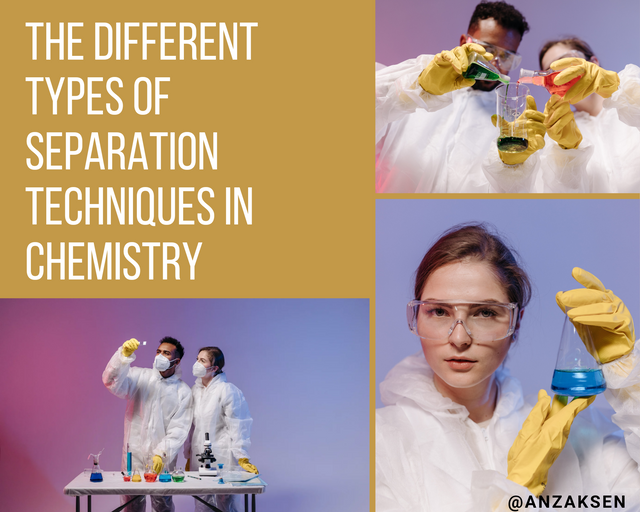The different types of separation techniques in chemistry
Good day dear members of campus connect, it's nice to be here again, I took a long break from Steemit when I encountered some problems but hopefully I'm back now. This is my second post in the community and I've said 50% to the community account so as to be a verified member. Here's a link to my first post . So today I'll be discussing on the various separation techniques I was taught back then in school and I hope you al enjoys it.
Separation techniques is a process whereby two or more liquids can be separated using different method. There are numerous ways to separate liquids and I've briefly explained them below.:
- Distillation
This is a process used in separating two or more pure liquids. It involves the vaporisation, condensation and isolation of the mixed liquids. This process isn't as sophisticated as it may sound as it it involves the mixture been heated and the volatile component evaporates first then the vapour will move down through a condenser and and it'll return in a liquid state.
- Filtration or Sedimentation
This is a common separation technique used to separate insoluble solid from a liquid. It involves a process of removing solid particles from liquid. E.g Sand and water mixture, a filter paper is placed in a container and the mixture is poured into it. The solid particles will remain on the filter paper and the water will pass through.
- Separating Funnel
This is the most easiest method used in separating two immiscible liquids. If two liquids are immiscible, the the density of the liquids will be different thus, a mechanism was made to easily separate the two mixture. E.g water and oil can be segregated when placed in a funnel and using a stop cock to time the removal of each liquids.
- Evaporation
This technique is well known and doesn't need any technical process conducting it. It involves the separation of water from other substances by boiling and making the water to evaporate thereby leaving the fine materials in the container.
- Magnetic Separation
This process is mostly used to separate solid materials. If two metals that are ferrous and non ferrous are mistakenly mixed together and are hard to differentiate, then we use a magnet to fish out the ferrous metals because all ferrous metals are magnetic.
I've come to the end of my publication, I really enjoyed writing it till now. I hope to publish more articles often in this community. Thanks for reading.
50% to community account (@campusconnectng)

.jpeg)
.jpeg)
.png)
.jpeg)
.jpeg)
@anzaksen, Thanks for sharing with us on @campusconnect Thanks
This post was upvoted by @dayographix using community account.

Thank you so much @dayographix, please when Will I get the verified tag.
Thank you for contributing to #LearnWithSteem theme. This post has been upvoted by @daytona475 using @steemcurator09 account. We encourage you to keep publishing quality and original content in the Steemit ecosystem to earn support for your content.
Regards,
Team #Sevengers
The #learnwithsteem tag focuses on teaching through tutorials and lessons some knowledge, skill or profession that you have. Please avoid using it if it's not about that. Thank you!
Wow @anzaksen your lecture was very nice I have learnt something from it although am not a science student but I have learnt different types of separation techniques in chemistry am very happy with this your lecture.
Please @campusconnectng, I haven't been verified and I've placed two in campus connect with 50% already